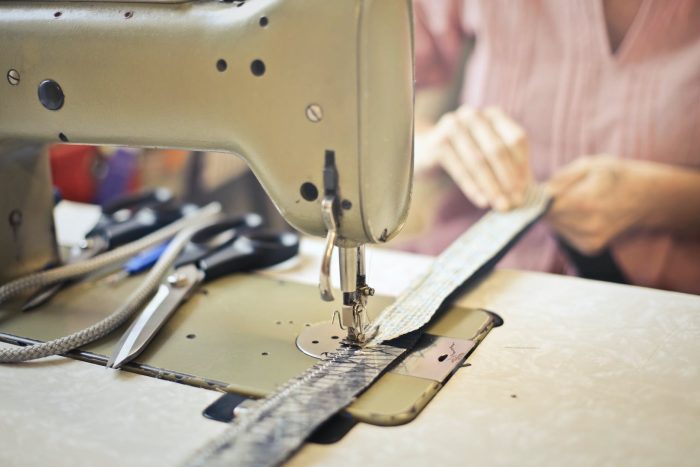Steps in the Right Direction
With so much pain and suffering in the world, it is easy to get sucked into the void. Into the feelings of despair and hopelessness. And while I am not here to tell you to look away, to discredit this pain or push it down…I want all of us to remember there is always hope. There are always people who care, who are working towards a future where we are all supported, held and looked after. It is like what Mr. Rogers would say, “Look for the helpers.”
In this case, the helpers come in the form of a federal bill focused on accountability in the fashion industry and the thousands of people who have contributed to drafting and supporting these measures.
- The FABRIC Act seeks to extend the anti-wage theft guidelines of The Garment Worker Protection Act (SB62) nationwide by holding brands accountable for wages across their supply chain coupled with encouraging brands to manufacture or reshore their manufacturing to the US with tax incentives and grant programs.
Accountability and transparency don’t seem to hold sway with words alone. It often appears that words have become empty vessels devoid of any real meaning. That’s why these acts are so important as they create accountability legislation that holds the fashion industry to their word and aims to transform the industry entirely. And it’s about time.
Take Victoria’s Secret for example, it took the brand thirteen months to agree to pay Thai garment workers the $8.3 million they were legally owed in unpaid wages and severance after abruptly closing a factory in 2021. This agreement was mostly due to months of campaigning and public pressure, but even then that is only the brand acknowledging they need to #PayUp. As of this writing no payment has been received.
And it isn’t just overseas operations, consider this country for example. Los Angeles is, by far, the largest apparel-production center in the US and up until the passing of SB62 (The Garment Worker Protection Act) in late September of 2021, sweatshop conditions were rife.
Then there’s the east coast. New York City has arguably been the fashion capital of the world for quite some time now. NYC’s fashion industry amasses almost $11 billion in total wages and accounts for 6 percent of the city’s workforce. This workforce is a cornerstone of the industry (and the city) and largely functions outside of basic labor protections.
Now, this isn’t to say that there hasn’t been strides to extinguish this gross exploitation in the fashion industry. In 2021, the United States passed the Uyghur Forced Labor Prevention Act and (as previously mentioned) California’s Garment Worker Protection Act.
Now that the stage is set, let’s dive into this act a bit more.
The FABRIC Act
Garment workers have long been a crucial piece of the United States’s economy. And for much of that existence, wage theft, abhorrent working conditions and “common sense” ethics have been overlooked in the name of profits.
In response, US Senator Kirsten Gillibrand, in collaboration with Remake, Workers United and the Garment Worker Center, introduced the Fashioning Accountability and Building Real Institutional Change (FABRIC) Act. The act challenges the fashion industry to do better by addressing systemic abuses that overwhelmingly affect women, immigrants and workers of color.
The global fashion industry is worth almost $3 trillion annually with women making up more than 70% of the total workforce. Here in The States, our garment industry generates $9 billion annually and employs 95,000 people. And yes, that is a sliver of revenue compared to its formative years, but people are gravitating back to Made in USA clothing.
The problem is that so much of the fashion industry’s supply chain is shrouded in contracting secrecy, establishing, furthering and supporting an industry with little to no oversight. In that same breath, much of the US’s apparel manufacturing has moved overseas. This bill incentivizes the garment industry to return Stateside. This initiative has already garnered bipartisan and industry-wide support.
“It’s time to take bold action at the federal level to change the fabric of the American manufacturing industry. The US was once home to a booming apparel manufacturing industry, and it’s time to reexamine how this industry has evolved over the past 50 years and change how we treat our workers,” said Senator Kirsten Gillibrand
The Legislation has 5 Pillars:
- Eliminate wage theft in US garment factories by enforcing minimum wage standards
- Combat workplace violations with increased brand accountability
- Increased brand/supply chain transparency
- Reshoring incentivized with tax credits
- Revitalize the industry through a $40 million domestic garment manufacturing grant program
These groundbreaking initiatives take SB62, California’s Garment Worker Protection Act, expand on and take them to a federal level. The bill would encourage companies to manufacture in The States with incentives like a 30% insourcing tax credit and the aforementioned manufacturing grant program to support manufacturers in updating their facilities.
Labor advocates and human rights groups aren’t the only ones that endorse the measure. Not only do many brands and manufacturers want to see systemic change on an ethical and environmental level, but they say that it is a way to level the playing field. A majority of these brands and manufacturers have voluntarily adopted rigorous environmental and labor standards in an effort to curb the exploitation of the land and her people for profits.
“By supporting the FABRIC Act, we ensure that people, human rights and dignity are central to fostering a more sustainable and transparent future in fashion,” said Nikki Eclarinal, Policy Manager of Fashion Revolution USA.
Just like the Bangladesh Accord, in response to the Rana Plaza Collapse, this incentives targeted focus could help (or perhaps force) other countries to adopt stricter ethical and environmental standards when it comes to the fashion industry.
If approved, it would amend the Fair Labor Standards Act of 1983 which, outside of the protections of SB62 in California, is the current law of the land and the standard for garment worker protections.
Holding brands to their word is an overwhelming problem in the fashion industry. The industry has long been exploiting all faucets of its structure. Actually, time out, the industry works exactly as intended. But actionable, transparent regulation is starting to catch up.
And perhaps we don’t celebrate the wins like we should because the sensationalism of discourse and trauma gets clicks and thus money. But changing the industry is possible! We have to believe that because it has been done before and it can be done again!
“As we saw with SB62, whether it will move to a vote and how fast will also come down to organizing and the passion and time that the coalition behind the Fabric Act is preparing to put into this,” said Elizabeth Cline, Director of Advocacy & Policy at Remake.
More Resources:
Learn how you can further your support of the FABRIC Act at Remake.

 Share on bsky
Share on bsky







Read 0 comments and reply